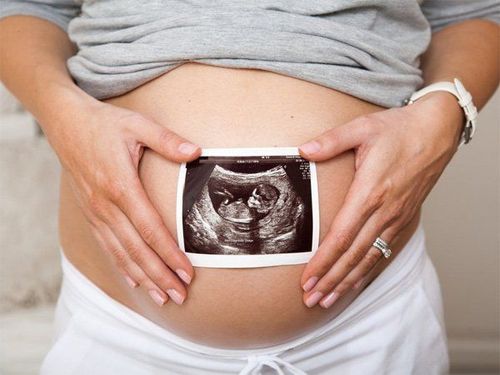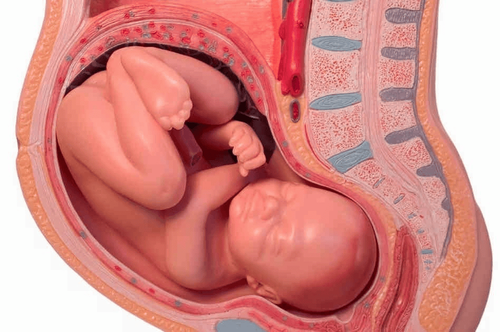Rapid fetal weight gain isn’t good for the baby or the mother. It increases the chances of needing a C-section and raises risks like gestational diabetes and complications during and after birth. So, what should a mother pay attention to when the fetus is found to be overweight?
1. When is a fetus considered overweight?
Mothers can refer to the standard fetal weight by month:
- From the 1st to 3rd month of pregnancy: Typically around 14g
- From the 4th to 7th month of pregnancy: Approximately 900–1300g
- From the 8th month to the end of pregnancy: About 2900–3400g
Babies born weighing 4kg or more are considered large. Fetal weight depends on several factors, such as:
Genetics, race, and maternal age: These are key determinants, accounting for about one-third of the fetal weight. Typically, mothers under 18 or over 40 tend to have smaller babies compared to those in their prime childbearing years.
Pregnancy order and interval between pregnancies: Firstborns are generally smaller than subsequent children. If the time between pregnancies is too short for the mother to recover fully, the second baby may also have a lower weight.
Maternal health and physical condition: Mothers with shorter stature or weaker immunity may have difficulties supporting optimal fetal development. Conversely, conditions such as gestational diabetes or obesity in the mother may lead to an above-average fetal weight.
Gender and fetal health conditions: Male babies often weigh more than female babies.
Nutrition for Pregnant Mothers:
If pregnant mothers maintain a well-balanced diet with adequate macro and micronutrients, the fetus is more likely to develop a healthy weight. However, the baby's nutrition also depends on the mother's ability to absorb nutrients through her diet, which determines how well the baby benefits from the nutrients provided. Many pregnant mothers focus excessively on eating for nourishment during pregnancy, which can lead to the fetus exceeding the standard weight. This is not necessarily a good sign, as it may pose potential risks.

2. Risks associated with an overweight fetus
A fetus with excessive weight poses risks to both the baby and the mother during pregnancy. For the baby, risks include hypoglycemia due to insufficient blood sugar levels, while insulin remains active in the body.
The baby may also exhibit weak crying reflexes, intermittent breathing cessation, lack of movement, or fainting episodes after birth. Prolonged labor and low blood sugar can cause brain damage, affecting a baby’s memory and learning later on.
Moreover, an overweight baby poses a risk of making vaginal delivery difficult for the mother. Additionally, the risks of bleeding, uterine atony, and perineal injury increase if the mother's pelvis has not expanded sufficiently to match the size of the fetus.
It is essential to closely monitor the child's development for potential issues such as postnatal lung conditions, risk of respiratory distress, risk of obesity, and postnatal metabolic disorders.
3. Important Notes for mothers with an overweight fetus
A rapidly growing fetus may increase the risk of miscarriage or preterm birth. Upon detecting this condition, mothers should take immediate action, including dietary adjustments:
- Adjust your diet by choosing fresh fruits and vegetables, which are nutritious but won’t make the baby gain weight too quickly. Cut back on sugary and starchy foods.
- Divide meals into smaller portions: Eating smaller, more frequent meals allows the digestive system to work efficiently, preventing excess nutrient absorption and controlling fetal weight gain.
- Exercise regularly: Maintaining a routine of physical activity during pregnancy not only improves mood but also enhances metabolism, converting calories and fats into energy more effectively. This helps prevent excessive maternal weight gain and supports balanced fetal development.

- Monitor weight gain: Maternal weight gain directly impacts fetal growth. Excessive maternal weight gain requires careful attention to diet, activity, and exercise routines to prevent rapid fetal weight increase, which could complicate childbirth.
Regular prenatal check-ups are vital for you and your baby. During these visits, your doctor will check your blood sugar, blood pressure, and the baby’s heart rate. They’ll also watch for swelling or other warning signs. Immediate medical attention is needed for symptoms like headaches, dizziness, or weight gain exceeding 1kg per week.
Check fasting blood sugar levels and blood sugar levels two hours after meals to screen for gestational diabetes. Attend prenatal check-ups, and based on test results, your doctor will provide specific guidance. It is crucial to monitor fetal movements throughout the day.
Mothers should have a cardiology check-up three weeks postpartum and an endocrinology consultation 4–6 weeks after delivery.
To arrange an appointment, please call HOTLINE or make your reservation directly HERE. You may also download the MyVinmec app to schedule appointments faster and manage your reservations more conveniently.















